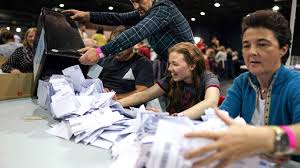Tories head for majority

The Conservatives have taken a string of former Labour strongholds, with the party forecast to win the general election with a comfortable majority.Jeremy Corbyn said it was a “very disappointing night” – and he would not lead Labour into the next election.Lib Dem leader Jo Swinson has lost her seat to the Scottish National Party.
Labour have lost seats across the North, Midlands and Wales in places which backed Brexit in the 2016 referendum.They are set to win 63 fewer seats than in 2017, it is suggested.
Speaking at his election count in Islington North, where he was re-elected with a reduced majority of 26,188, Mr Corbyn said Labour had put forward a “manifesto of hope” but “Brexit has so polarised debate it has overridden so much of normal political debate”.He also took a swipe at “media intrusion” – and said he would not lead the party into the next election, but would stay on while a period of “reflection” takes place in the party.
Speaking after he was re-elected in Uxbridge, west London, with a slightly higher majority, Prime Minister Boris Johnson said: “It does look as though this One Nation Conservative government has been given a powerful new mandate to get Brexit done.”Jo Swinson – who only became Lib Dem leader in July and began the election campaign by saying she aimed to be prime minister – lost her Dunbartonshire East to the SNP by 149 votes
Nigel Dodds, the leader of the Democratic Unionist Party, lost his Belfast North seat to Sinn Fein
The Lib Dems took Richmond Park, south-west London,from Conservative minister Zac Goldsmith Labour’s Caroline Flint – who backed the Tory Brexit deal in defiance of her party – lost her Don Valley seat to Mr Johnson’s party SNP leader and Scotland’s First Minister Nicola Sturgeon said it had been an “exceptional night” for her party.
She said Scotland had sent a “very clear message” that it did not want a Boris Johnson government and that the prime minister did not have a mandate to take Scotland out of the EU.Some traditional Labour constituencies, such as Darlington, Sedgefield and Workington, in the north of England, will have a Conservative MP for the first time in decades – or in the case of Bishop Auckland and Blyth Valley – for the first time since the seat was created.
Labour took Putney, in south-west London, from the Tories, in a rare bright spot for Jeremy Corbyn’s party.The exit poll taken at 144 polling stations, with 22,790 interviews, has been adjusted to take actual results into account.
Conservative Home Secretary Priti Patel said the government would move quickly to “get Brexit done” before Christmas by introducing legislation in Parliament, if it is returned to power.
Media captionJohn McDonnell: “I think most people thought the polls were narrowing”.A row has already broken out at the top of the Labour Party over who is to blame for what is expected to be its worst general election result in decades.
Downing Street said in a statement that if the exit poll was correct, and Mr Johnson was returned to Downing Street, there will be a minor cabinet reshuffle on Monday.The Withdrawal Agreement Bill, paving the way for Brexit on 31 January, would have its second Commons reading on Friday, 20 December.
A major reshuffle would take place in February, after the UK has left the EU, No 10 added, with a Budget statement in March.This is the UK’s third general election in less than five years – and the first one to take place in December in nearly 100 years – and has been dominated by Britain’s 2016 vote to leave the European Union.
Mr Johnson focused relentlessly on a single message – “get Brexit done” – promising to take the UK out of the EU by 31 January 2020 if he got a majority.Labour primarily campaigned on a promise to end austerity by increasing spending on public services and the National Health Service.
Nigel Farage said his Brexit Party had taken votes from Labour in Tory target seats, although he himself had spoiled his ballot paper “as I could not bring myself to vote Conservative”.





